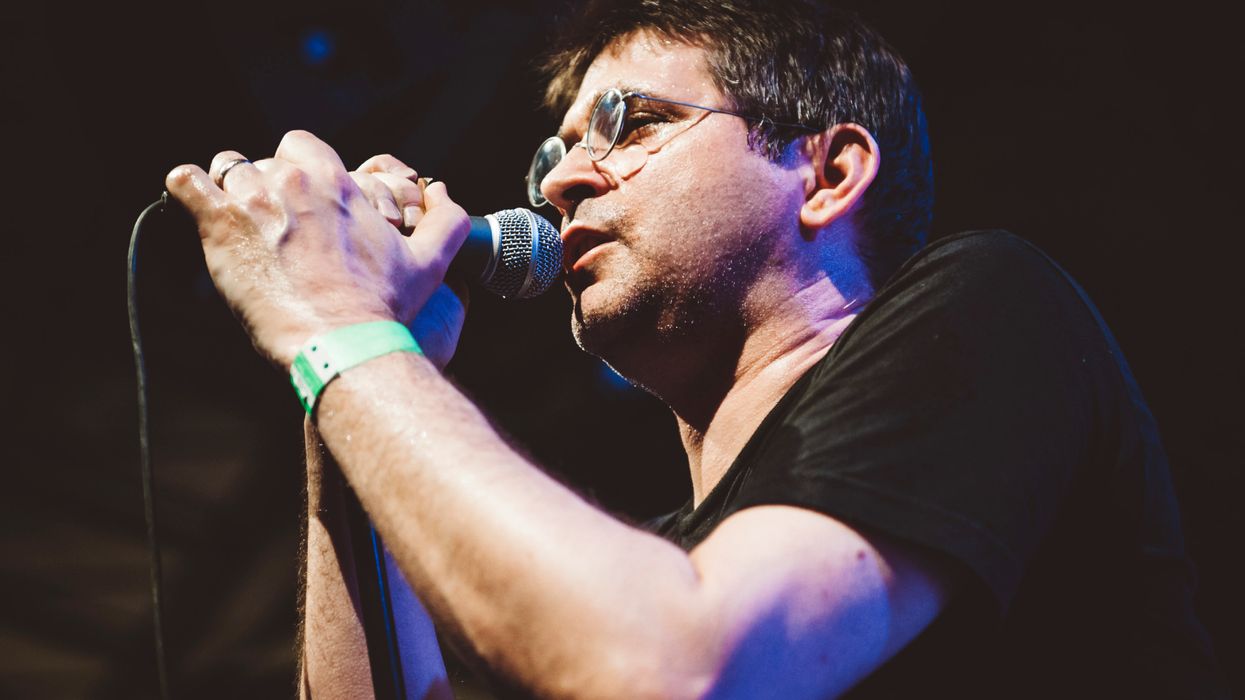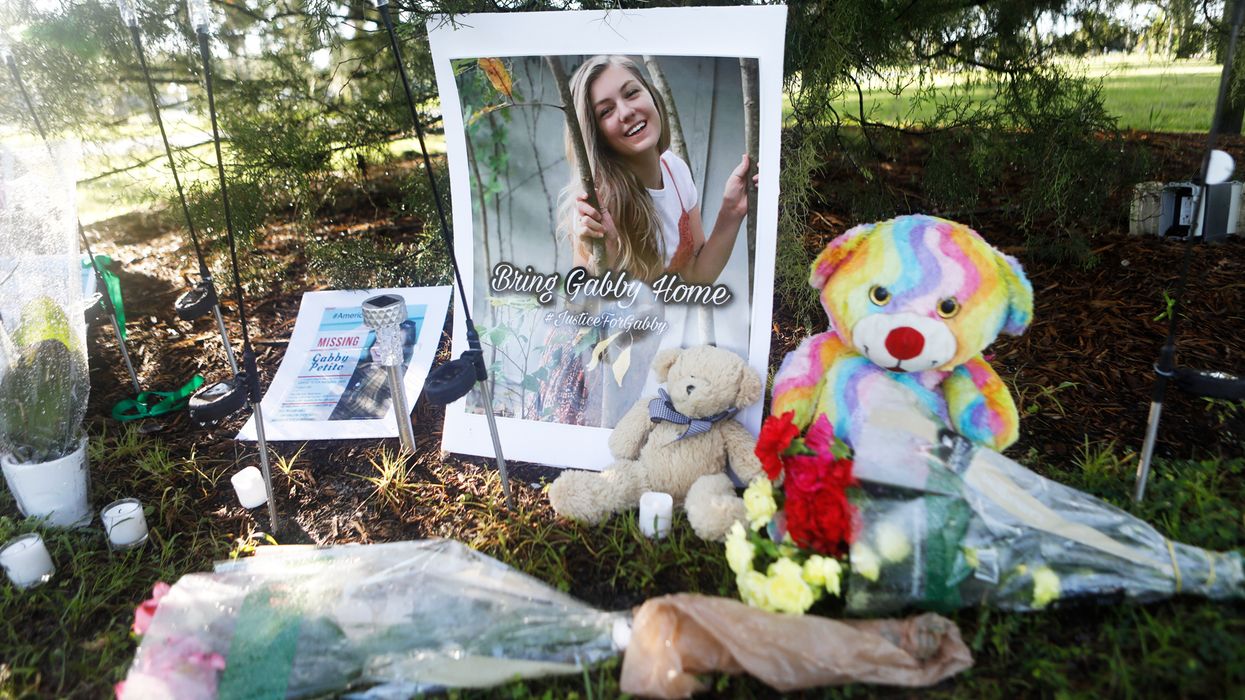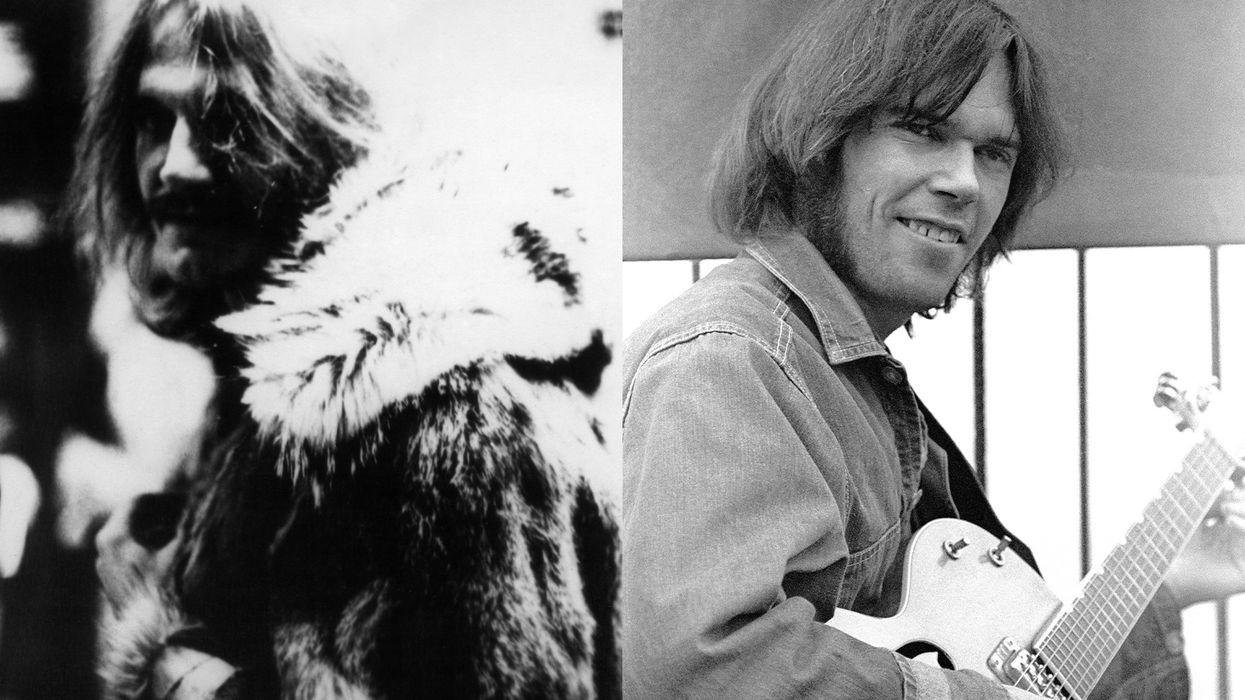Search
Don’t Miss Out
Journalism that matters. Music that inspires.
Most Popular
More Stories
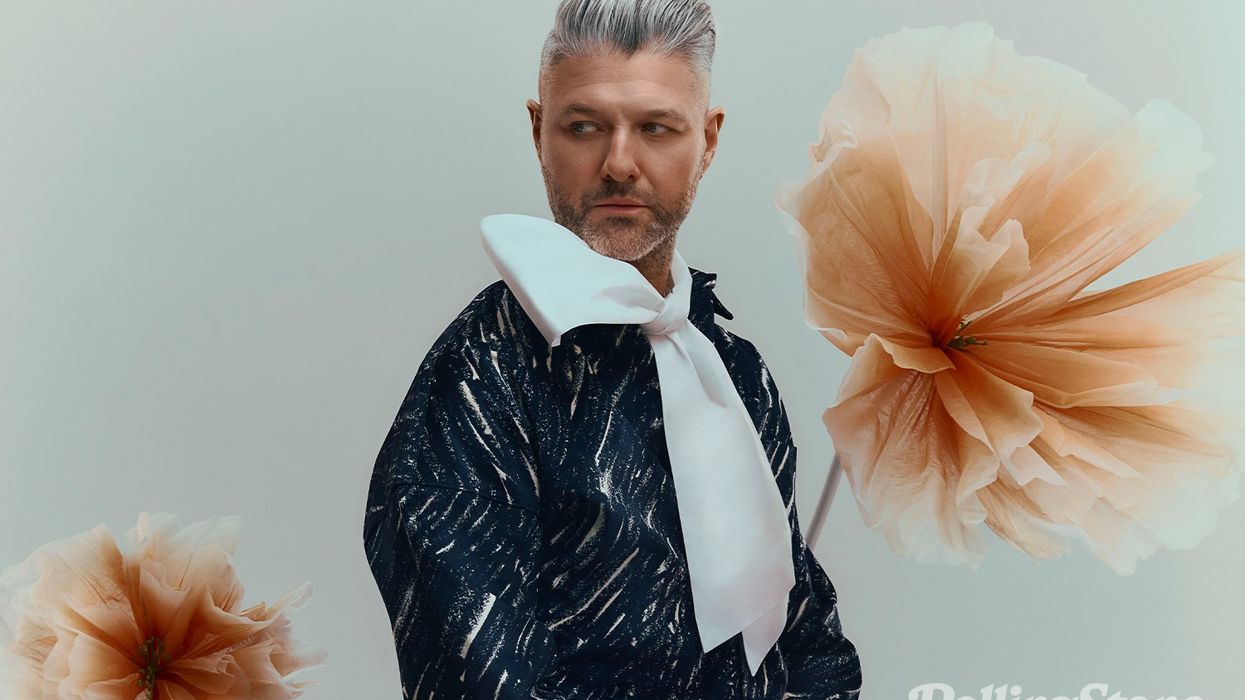
Cotton two-piece by Marni, SSENSE.com / Shirt from personal collection
Photographer Guillaume Boucher / Stylist Florence O. Durand / HMUA: Raphaël Gagnon / Producers: Malik Hinds & Billy Eff / Studio: Allô Studio
Pierre Lapointe, Grand duke of broken souls
Feb 14, 2025
Many years ago, while studying theatrical performance at Cégep de Saint-Hyacinthe, Pierre Lapointe was given a peculiar exercise by his teacher. The students were asked to walk from one end of the classroom to the other while observing their peers. Based solely on their gait, posture, and gaze, they had to assign each other certain qualities, a character, or even a profession.
Lapointe remembers being told that there was something princely about him. That was not exactly the term that this young, queer student, freshly emancipated from the Outaouais region and marked by a childhood tinged with near-chronic sadness, would have instinctively chosen for himself. Though he had been unaware of his own regal qualities, he has spent more than 20 years trying to shed this image, one he admits he may have subtly cultivated in his early days.
That, however, is proving to be a difficult task. With Dix chansons démodées pour ceux qui ont le cœur abîmé, his fifteenth full-length album, he once again asserts his boldness and classicism, solidifying his place as the Grand-duke of sensitive souls.
In 2004, Pierre Lapointe arrived ‘accidentally’, as he claims, onto the Quebec cultural scene with a grandiose and theatrical French Chanson, which starkly contrasted with the musical offerings of the time. Wedged between Crazy Frog, Gwen Stefani, and Simple Plan, a dandy who seemed to have been plucked from another century sang about his desire to lick every window of the columbarium, dreaming of sleeping there in peace, on a composition that sounded as if it had been borrowed from Jacques Brel himself.
Beneath Pierre Lapointe’s baroque elegance lies a mind in constant motion. From the moment his self-titled debut album found success, he never relented, continuously releasing albums, performing concerts, winning awards, and making television appearances.
But this frenzy came at a cost. Before the pandemic, the artist was pushing himself at a relentless pace.
"When everything stopped, I was heading straight into a wall. I was exhausted, I think I was on the verge of burnout. So, in a way, it was a blessing," he admits.
"My father used to ask me, whenever I talked about my schedule and how I felt, ‘But are you sleeping?’ And I’d answer, ‘Not much.’ That’s a sign that stress has taken over. He would tell me he was worried. When the pandemic hit, he was the first to say, ‘I’m glad you’re canceling everything and taking a break.’"
The timing of this break was perfect. When his longtime manager retired, Lapointe built a new team, leading to a shift in his approach, where he finally learned to do less. His new manager, Laurent Saulnier, the powerhouse behind the success of the Montreal Jazz Festival and Francofolies, gave him flak for being too prolific.
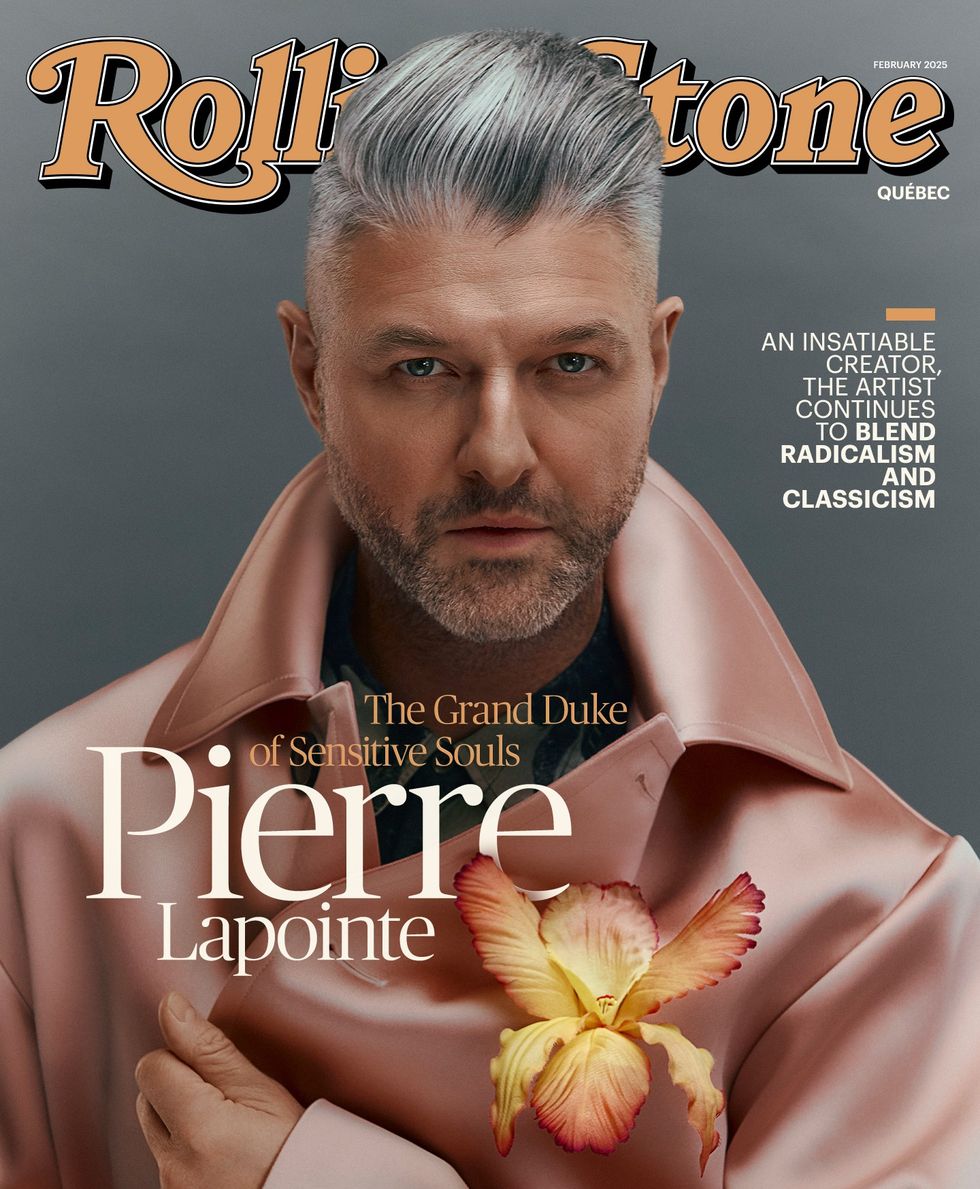
"He told me, ‘Your albums may be great, but you're saturating your own market. You release an album, and people don’t even realize it’s new. The messages are all getting mixed up.’"
For someone whose music is just one outlet for his creativity, this was a chance to return to other passions. After working on theater productions and film scores, Lapointe collaborated with Swiss visual artist Nicolas Party on L’Heure Mauve, an exhibition for which he created a soundtrack.
He also returned to drawing, having initially studied visual arts in Cégep, and designed various pieces of furniture, including a series of tables, carpets, and a Memphis-style lamp, "because the creator in me never stops." This forced break, he believes, allowed him to reconsider his approach to music and performance. He slowed down, rethought his creative process, and accepted that sometimes, less is more. Exploring other forms of art such as design, illustration, and scenography was not a diversion from music, but a complement that helps build his artistic universe. This multidisciplinary approach keeps his inspiration fresh without exhausting him. Having always envisioned his albums as total works of art, where visuals and music intertwine, Lapointe is now pushing that concept even further.
True to his love of theatricality, Lapointe has often structured his concerts as live tableaux. But the artist who once hid behind his piano now embraces a bolder, more embodied stage presence. For his upcoming show, he will stand front of stage almost the entire time, flanked by two pianists, Amélie Fortin and Marie-Christine Poirier, fully assuming his role as the central figure. This shift in stage presence stems from a broader reflection on his relationship with the audience, which has evolved over the years.
Early on, he explained that the piano acted as a shield between him and the audience, which adds another layer to ‘Toutes tes idoles’ when he sings: "You don’t like seeing people cry / It awakens the pain beneath / Of the child who grew up too fast and learned to arm himself to the teeth."
"Now, I want to be up front. I have no problem with it anymore, but back then, it was different. You have to understand that my teenage years were complicated," he confides. "I was deeply sad and depressed. I didn’t feel comfortable in my own skin, like so many teenagers. Being gay surely played a role in that. I found the world very ugly. I needed aesthetics, I needed beauty."
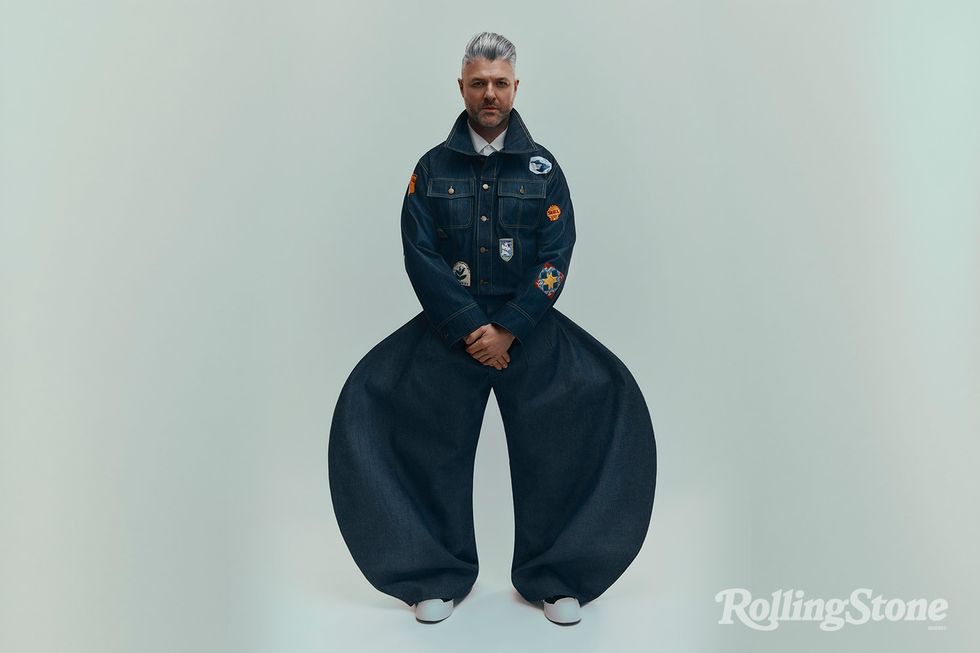
"Then the piano arrived. It lifted me up. It healed me. I would play notes, sometimes the same note for hours. And I would say, ‘I’m healing myself.’ The resonance calmed me. Looking back, it was a form of music therapy. I was healing through sound."
That healing process is especially evident on this album, particularly in the poignant “Comme les pigeons d’argile”, a tribute to his mother, written after her Alzheimer’s diagnosis. In “Madame Bonsoir”, he converses with the Grim Reaper, arriving, as always, at the worst possible time.
This album, however, was not originally intended for him. Lapointe explains that the songs in Dix chansons démodées pour ceux qui ont le cœur abîmé started as an exercise—an attempt to create something in the spirit of the classic French chanson he grew up with, but infused with his taste for the radical and refined. Initially, the plan was to offer these songs to other singers.
"There has never been an album where I went only halfway in a direction. When I finished writing these songs, which I had not written for myself, and then pieced them together, I realized I had to make an album out of them," he explains. "I told myself I had to go full speed ahead. The arrangements, my pronunciation—sometimes I pronounce the ‘E’ sounds like they did in the ’50s and ’60s Chanson réaliste [genre]. In the way I control my breath, in the fervor of my delivery, I went all in."
"Like Monique Leyrac, like Diane Dufresne, like Pauline Julien—artists who studied theatre, who ventured into Rive Gauche chanson [genre]. Singers who projected their voices like actresses, who could sing Kurt Weill as easily as they could sing Gilles Vigneault, but always with authority."
The Rive Gauche genre he evokes refers to the cultural movement that emerged in Paris’ left bank, in the 50s and 60s. In the heart of the Latin Quarter, intellectuals, artists and other bohemians would gather in smoky cabarets, where one could happen upon Sartre, Miles Davis, Juliette Gréco or Gainsbourg. Poetic, clamoring, theatrical; those are the songs that would come to redefine French music for the next half-century, and with which Lapointe grew up.
The result? Dix chansons démodées pour ceux qui ont le cœur abîmé has already become one of the most critically acclaimed albums of early 2025. At the time of publishing, it holds the top spot on the ADISQ sales charts.
January has been filled with constant back-and-forth travel between Québec, where Lapointe is preparing for his spring tour while also serving as the new coach on the TV series Star Académie, and France, where he has been spending several months a year.
He enjoys considerable success across the Atlantic, but more importantly, he holds the coveted status of an "Artiste"—with all the French reverence that title entails. Almost, as he jokingly puts it, as if he was more French than the French themselves.
Recently, after appearing on the hugely popular French television show Taratata, he was approached by the manager of a major French star, someone who had worked with all the greats of francophone music. "He told me that for years he had been trying to convince artists to make albums like they did in the era of Jacques Canetti, the 1960s music producer who discovered Félix Leclerc, among others. But every time, people backed out halfway, afraid to commit. He told me, ‘When I listened to your album, I felt like I was hearing a great record from that era, without compromise, yet completely contemporary.’"
Paradoxically, he also sees himself as the most Québecois of all Québec artists who have successfully exported themselves to France, when compared to figures like Garou, Isabelle Boulay, or Cœur de Pirate. "When I talk to people, they think I have a thick accent. To them, I’m unmistakably Québecois, with a very Québecois approach," says Lapointe. "(Those artists) are stars. Me, I’m a well-known singer in the Chanson world, and in a somewhat intellectual, outsider circle. The music industry, the contemporary art scene, the theatre world…"
It is true that his list of friends and collaborators is impressive. The music video for “Toutes tes idoles”, the first track on the new album, was filmed in the studio of ceramist Johan Creten. Lapointe was also invited to sing at the birthday celebration of French artist Jean-Michel Othoniel. On his Instagram feed, he is seen posing alongside the legendary Amanda Lear, Salvador Dalí’s muse.
"I have a strange status over there, one I don’t quite understand. I was named a Commander of Arts and Letters. Not a Knight—straight to Commander. I haven’t even received a medal in Québec or Canada yet!" he says, laughing. "I’m the only Canadian in history to have been immortalized by Pierre et Gilles, which is pretty funny. At the exhibition, there was Marilyn Manson and Madonna next to us. Nina Hagen was there too. And then there was Pierre Lapointe. Not Bryan Adams or Céline Dion."
There is a certain pride in his voice when he speaks about these experiences, but it is tempered by his naturally reserved nature. It is clear that Pierre Lapointe, despite his sharp pen and well-honed aesthetic sense, does not embody the role of an aloof, princely dandy. In fact, he struggles to understand how this perception took hold in the first place.
"When my success began, it completely overtook me, and my image was so strong that I could be walking down the street in sweatpants, and people would still call me ‘Sire’ and speak to me in poetic prose," he recalls. "I had only ever been to two or three poetry nights, and every time I just wanted to vomit on everyone and storm out yelling ‘You’re all so boring!’ And yet, here I was, suddenly considered a poet, with journalists asking me about Baudelaire and books I had never even read."
The dilemma in all of this is that it makes it even harder to pin down exactly who—or what—Pierre Lapointe really is. To strip him of the title of "poet" would be to overlook the raw and solemn beauty of a song like Le secret, which hides behind its bossa nova rhythms, and to forget the millions of tears shed around the world while listening to his music. And though he rejects the label of "dandy," he has nonetheless always been impeccably dressed at every one of our encounters, regardless of fatigue or illness.
The Pierre Lapointe we imagined on our television screens 20 years ago may not have been the one we thought he was. Or perhaps, he simply wasn’t that person yet.
Because despite all the sadness of his adolescence, and even though nothing was truly calculated, he feels that "there is a real symbiosis between who I knew I was and what I have done."
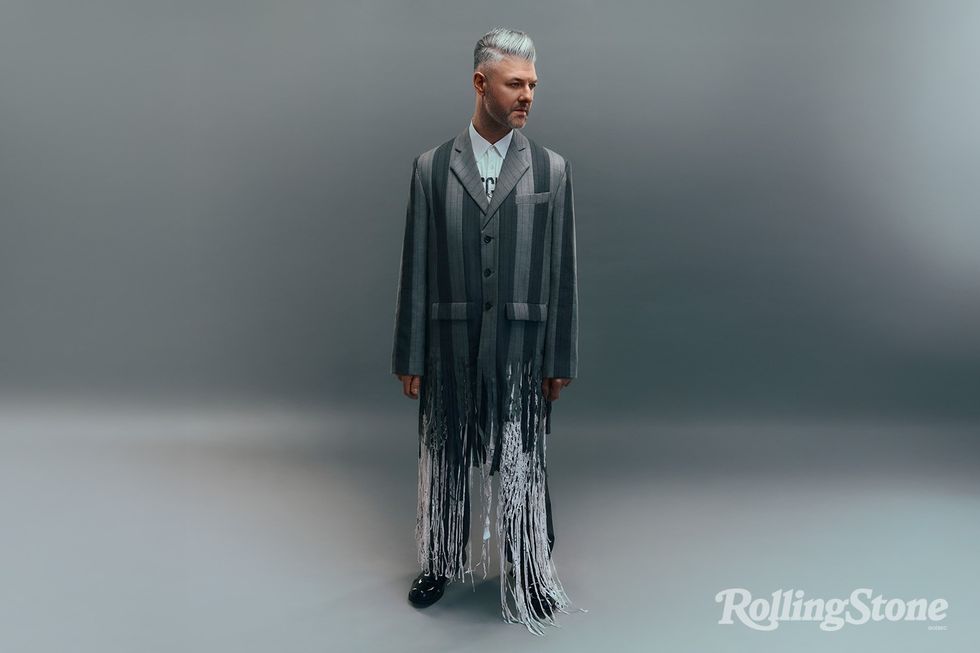
It was only last year, while promoting the 20th anniversary of his debut album, that he fully reconnected with the mindset he had back then. "It was as if I already knew everything that was coming," he recalls. "I knew I would work with individual artists, that I would be involved in theatre, that I would collaborate with directors, designers, architects. I knew I would travel, that I would make tons of albums, that I would go in all directions. But I hadn’t done any of it yet. When I talked to people, there was a gap between what I projected, what I said, and what I had actually done. Now, with hindsight, I understand."
In the end, perhaps Pierre Lapointe is not so much trying to escape his persona as he is trying to break free from a static image of himself—one defined by our perceptions rather than by the full scope of his talent or his desire to create something beautiful and meaningful.
By embracing, with pride, the role of the Rive Gauche crooner, he demonstrates that true audacity is not found in the medium itself, but in the sincerity of a fully and fearlessly realized artistic gesture.
Keep ReadingShow less
Featured Stories
Don’t Miss Out
Journalism that matters. Music that inspires.
DNC Brings in Higher Ratings Than RNC All Four Nights
Aug 23, 2024
The numbers are in, and the viewership of the Democratic National Convention blew last month’s Republican National Convention out of the water.
Early numbers by Nielsen Fast Nationals indicate that the final night of the DNC garnered 26.20 million viewers across 15 networks, compared to night four of the 2024 RNC Night 4 at 25.4 million viewers.
The DNC drew in more viewers across 12 different cable and broadcasting news networks all four nights of the convention. 20 million on Monday, 20.6 million viewers on Tuesday, 20.2 million on Wednesday, and the estimated 26.20 on Thursday.
By contrast, the RNC drew in 18.1 million, 14.8 million, 18 million, and 25.4 million viewers on each of its respective four nights.
These numbers don’t even factor in the hundreds of thousands who viewed the convention on independent streaming services like YouTube, Twitch, and other social media platforms.
During Vice President Kamala Harris’s nomination speech on Thursday her opponent, former President Donald Trump, spiraled into a multi-platform meltdown that continued into Friday.
One factor driving the former president’s unraveling might be his concerns that more people are paying more attention to Harris than to him. As previously reported by Rolling Stone, days before the convention even began, Trump was badgering his media and political allies for reassurance that the DNC would have fewer viewers than his own convention.
From ratings to crowd sizes, the former reality TV star has harbored a longtime obsession with quantifying how much people like him — a fixation that Democrats made a point to poke fun of during the convention.
On Tuesday, Former President Barack Obama — who Trump famously, and falsely, claimed had a smaller inauguration crowd than him — mocked his successor’s obsession with size as a sign he was that he was compensating for … other deficiencies. The viewership of the DNC isn’t the only metric through which Harris is trouncing Trump. According to July’s fundraising numbers, the Harris campaign more than quadrupled the former president’s cash haul last month — a staggering $204 million compared to Trump’s $48 million.
Keep ReadingShow less
Marketer Behind Fake Quotes in ‘Megalopolis’ Trailer Dropped by Lionsgate
Aug 23, 2024
Eddie Egan, a very real marketing consultant, lost his gig with Lionsgate this week after the studio discovered that quotes he used in a trailer for Francis Ford Coppola’s Megalopolis were fabricated, according to Variety.
The conceit behind the teaser, which Lionsgate recalled on Wednesday, was that critics had trashed Coppola’s masterpieces throughout the decades, so why trust them? Except that the critics quoted didn’t actually write any of the pith. A quote attributed to Pauline Kael that was said to have run in The New Yorker, claiming The Godfather was “diminished by its artsiness,” never ran.
It’s likely that the consultant used A.I. to generate information, a source familiar with the matter told Rolling Stone, who adds it was never the studio’s intention to fabricate quotes and said that when the studio realized there was a problem, it reacted immediately and apologized.
Variety reports that a prompt to ChatGPT for negative press around Coppola returned similar statements but that in reality Kael loved The Godfather.
Egan did not return Rolling Stone’s request for comment. Neither did a rep for Lionsgate.
Egan has been an independent contractor since parting ways with STX film group in 2019. While at STX and previously at Universal, Variety reports, that he worked closely with Adam Fogelson, who’s now Lionsgate’s film group chairperson.
“Lionsgate is immediately recalling our trailer for Megalopolis,” the company said in a statement Wednesday. “We offer our sincere apologies to the critics involved and to Francis Ford Coppola and American Zoetrope for this inexcusable error in our vetting process. We screwed up. We are sorry.”
Coppola’s Roman epic Megalopolis, which stars Adam Driver, Giancarlo Esposito, and Nathalie Emmanuel, is set to come out Sept. 27.
Rolling Stone’s bona fide film critic, David Fear (also a real name), praised the movie when it premiered at Cannes. The following quote is verifiable, and you can fact-check it.
“Say what you will about this grand gesture at filtering Edward Gibbon’s history lessons through a lens darkly, it is exactly the movie that Coppola set out to make — uncompromising, uniquely intellectual, unabashedly romantic (upper-case and lower-case R), broadly satirical yet remarkably sincere about wanting not just brave new worlds but better ones,” Fear wrote. “Does it sometimes feel as if it’s distilling decades’ worth of book-club readings and coffee-klatch conversations into a tightly packed two hours? Yes. Was it worth the wait? Dear god, yes.” (Fear’s choice of Roman font, pun intended, and italics are also very real.)
Keep ReadingShow less
Fact Checkers Try to Shield Trump From Project 2025’s Abortion Madness
Aug 23, 2024
One of the odder features of American journalism is that the columnists who hold themselves out as “fact checkers” and review claims made by politicians — calling balls, strikes, and “pinocchios” — are unusually terrible at it.
Fact checkers offered up several botched reviews of content from the Democratic National Convention, but nothing has broken their brains like Democrats’ sustained attacks on Donald Trump over Republicans’ anti-abortion agenda, which is laid out in gory detail in conservatives’ Project 2025 policy roadmap.
The former president has actively attempted to run away from Project 2025, because the policy goals laid out in the 887-page blueprint are deeply unpopular. Trump has claimed, “I know nothing about Project 2025, [and] I have no idea who is behind it.” On Thursday, he again claimed to “HAVE ABSOLUTELY NOTHING TO DO WITH” it.
It’s an absurd claim: The policy manual was written in large part by former top Trump administration officials — and when he spoke at a 2022 event hosted by the Heritage Foundation, the think tank behind Project 2025, Trump said: “This is a great group, and they’re going to lay the groundwork and detail plans for exactly what our movement will do and what your movement will do when the American people give us a colossal mandate to save America.”
As Rolling Stone has reported, sources say that Trump has been directly briefed by confidants and close aides on Project 2025’s substance and progress. Top officials involved with the project are expected to have senior roles in a Trump administration.
Instead of fact checking Trump’s clearly false claim that he knows nothing about Project 2025, fact checkers have decided they — and everyone else — must simply take him at his word. Further, Democrats must be punished for tying Trump to its unpopular policy proposals.
The Poynter Institute’s Politifact already beclowned itself earlier in the week by declaring it was unfair of the DNC to broadcast a video of Trump from 2016 saying “there has to be some form of punishment” for people who have abortions, because he “walked back the comment.”
On Thursday, Politifact’s staff reviewed Vice President Kamala Harris’ claim that Trump “plans to create a national anti-abortion coordinator and force states to report on women’s miscarriages and abortions.”
Politifact deemed Harris’ claim “mostly false” because Project 2025 “isn’t Trump’s plan,” adding that “Trump and his campaign have repeatedly said they were not involved in the project and Trump is not listed as an author, editor, or contributor.”
It’s hard to say how inappropriate this is, but things quickly got worse.
“Project 2025 doesn’t mention a ‘national anti-abortion coordinator.’ The document calls for a ‘pro-life politically appointed Senior Coordinator of the Office of Women, Children, and Families,’” Politifact wrote. “It says the U.S. Centers for Disease Control and Prevention’s abortion surveillance and maternal mortality reporting systems are inadequate and proposes withholding federal money from states that don’t report to the CDC how many abortions take place in their states.”
These are virtually the same things.
The article also pans Harris’ supposedly “predictive” claim that Trump wants to “enact a nationwide abortion ban,” noting that “Trump said this year he would not sign a national ban.” This is true — but shortly before the former president announced that abortion should be a state issue, he openly mulled endorsing a national abortion ban.
It’s obviously worth considering, too, that Trump appointed three conservative Supreme Court justices whose votes were essential to overturning Roe v. Wade, allowing states to ban abortion — an accomplishment he openly brags about.
Politifact concludes that Harris “exaggerates Trump’s abortion agenda by tying him to Project 2025 ‘allies.’”
Is it really a journalist’s job to declare with certainty that the issue position Trump has settled on, as a matter of politics, is exactly what he would do as president? Absolutely not. It’s even more irresponsible coming from pundits holding themselves out as “fact checkers.”
If that is indeed their job, they should throw in the towel.
Keep ReadingShow less
Cops Who Falsified Warrant Used in Breonna Taylor Raid Didn’t Cause Her Death, Judge Rules
Aug 23, 2024
A federal judge in Kentucky ruled that two police officers accused of falsifying a warrant ahead of the deadly raid that killed Breonna Taylor were not responsible for her death, The Associated Press reports. And rather than the phony warrant, U.S. District Judge Charles Simpson said Taylor’s boyfriend, Kenneth Walker, was responsible for her death because he fired upon the police officers first — even though he had no idea they were police officers.
The ruling was handed down earlier this week in the civil rights violation case against former Louisville Police Detective Joshua Jaynes and former Sgt. Kyle Meany. The two were not present at the March 2020 raid when Taylor was killed. Instead, in 2022, Attorney General Merrick Garland accused the pair (along with another detective, Kelly Goodlett) of submitting a false affidavit to search Taylor’s home before the raid and then conspiring to create a “false cover story… to escape responsibility” for preparing the phony warrant.
Prosecutors had argued that this phony warrant put Taylor in danger. But Simpson dismissed the claim that armed officers conducting a middle-of-the-night raid on a no-knock warrant based on made-up intel that a suspected drug dealer was receiving packages at Taylor’s apartment had anything to do with her eventually being shot and killed. “There is no direct link between the warrantless entry and Taylor’s death,” Simpson wrote.
Instead, he argued that Walker was far more responsible. When the police barged into Taylor’s apartment, Walker fired a shot, thinking the police were intruders and hit a cop in the leg. In response, the police fired over 30 shots inside the apartment, with five or six striking Taylor.
Simpson decided that Walker’s “conduct became the proximate, or legal, cause of Taylor’s death.” (Walker was briefly arrested and charged with attempted murder of a police officer, but that charge was dropped. In 2022, he settled a $2 million civil suit with the city, accusing the cops of violating his civil rights by not announcing themselves upon executing the raid.)
“While the indictment alleges that Jaynes and Meany set off a series of events that ended in Taylor’s death, it also alleges that Walker disrupted those events when he decided to open fire,” Simpson said.
In a statement, Taylor’s family told The AP they were “devastated” by the ruling and were still “trying to process” the decision. “The only thing we can do at this point is continue to be patient … we will continue to fight until we get full justice for Breonna Taylor,” they said.
Taylor’s family also said prosecutors told them they planned to appeal the decision. The Justice Department said it “is reviewing the judge’s decision and assessing next steps.”
For now, Simpson’s ruling has hobbled the DOJ’s civil rights violation case against Jaynes and Meany, reducing the charges to misdemeanors. Jaynes is still facing a conspiracy charge, while Meany is accused of making false statements to investigators. Goodlett previously pleaded guilty to the charges against him and is expected to testify against the others.
Keep ReadingShow less
Load More
Rolling Stone Québec
ROLLING STONE QUÉBEC is a registered trademark of ROLLING STONE, LLC, a subsidiary of Penske Media
Corporation.
©2025 ROLLING STONE, LLC. Published under license.
©2025 ROLLING STONE, LLC. Published under license.





